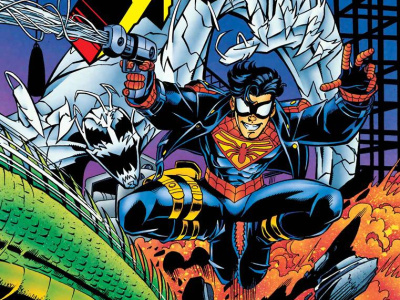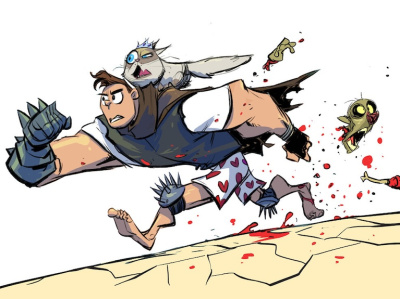
With formerly powerhouse e-commerce companies such as e-Toys shutting down, Amazon laying off large numbers of employees and predicted by some to run out of cash by the end of the year, and general carnage and destruction everywhere, ICv2 thought it was time for another look at the e-commerce landscape in the pop culture industry. Surprisingly, the number of players has not shrunk as much as one would have expected since we covered this topic last July (see 'Dot Com Dispatch'). Although some major companies have collapsed, most of the companies in these categories continue to operate without visible signs of additional capital. First we'll look at the companies involved, then try to draw some conclusions about the future of e-commerce for pop culture products.
First let's look at some of the biggies that operated in this category. Etoys is gone?first announcing that its Christmas sales would only be half what was expected, then laying off 70% of its employees, then shutting down and preparing to sell the bones. This was one of the better e-commerce companies at service, fulfillment, site design and selection. Its collapse, primarily due to scaling up to an unrealistic level and burning through its available capital with no access to more is a sign that even the best pure-play e-commerce companies are at the mercies of the capital markets, and if they don't have enough money from existing investors to get to break-even, they're probably dead.
Video, music, and former videogame and licensed merchandise retailer Checkout.com, financed by Mike Ovitz and Ron Burkle's Yucaipa Companies, is still selling videos and music, but has been absorbed by little-known Amplified Holdings. DVD, videogame, and movie merchandise retailer Express.com, also financed by Yucaipa Companies with videogame producer Eidos (Tomb Raider) is still around in a reduced state. Eidos severed ties with Express last November, indicating in public statements that its $55 million investment is now worthless. After numerous disputes over hundreds of thousands of dollars in unpaid fees to affiliate sites, Express' Gamefan network shut down its site and magazine late last year. Express seems to have successfully made its transition from defunct e-commerce software provider Pandesic and is still selling DVDs, apparently hoping that with a narrower focus and the collapse of some competitors it can continue to operate until it is sold or becomes profitable.
After totally shutting down for a time last summer, collectible toy retailer ActionAce.com is still alive and has revived content and community features. It's also offering substantial numbers of American toy skus in addition to the import products that are its strength. According to insiders, it's being financed by the Asian investors that originally contributed funding to the site in the hope that it will achieve profitability or find a buyer. It's definitely scaled back from its peak and has totally different management, but it's still in there punching.
Animedepot.com and Syco Distribution have evaded the grim reaper for now, with additional funding from Alliance Equities and a new strategic alliance with Ross Rojek's Thecomicstore.com. Rojek is also claiming up to $2 million in new financing for his retail and wholesale ventures, although reading between the lines of the press release, it isn't clear that it's closed yet, or that the full amount will be funded immediately. Rojek is also serving as co-CEO of Syconet with Bill Spears. Founder Sy Picon has resigned from active participation in Syco.
When we saw Buddy Saunders a few months back, he said his Mycomicshop.com was profitable and growing steadily. Chuck Rozanski's Mile High operates three Zshops at Amazon.com offering around 9000 skus, with little change to its Milehighcomics.com site. Westfieldcompany.com continues to emphasize pre-orders, with some new improvements to their online ordering process.
Nextplanetover.com (see 'Profile') parent eHobbies has been through successive layoffs, reducing staff from around 140 at its peak to around 60 now. And although co-founder Brad Sobel is still listed as CEO on the site, rumor has it he's also been replaced and has taken another position with the company. While content and merchandising are less frequently updated, NPO continues to offer one of the largest selections of new and recent pop culture products on the web, based on its continuing exclusive relationship with Diamond. NPO will probably not be significantly affected by eHobbies' impending transition from its defunct Pandesic software platform to a new one that is rumored to be powered by Yahoo store software because of its largely independent e-commerce engine obtained as part of the acquisition of the company last year.
{IMAGE_2}
We've reported previously on Fandom's new CEO and layoffs (see 'Fandom Replaces CEO'). Since then, new CEO Debra Streicker-Fine has wasted no time in bringing in her own COO -- Roy Kim -- who previously worked with her at Cloud 9, a cd-rom development company that licensed Marvel properties, among others.
The financing situations of eHobbies and Fandom have some interesting parallels. Ehobbies was the first investment by eCompanies, a VC firm and incubator formed by Earthlink founder Sky Dayton and former Disney Interactive exec Jake Winebaum. ECompanies also led a second round of funding in eHobbies. Fandom's second round was the first investment by Redpoint Ventures, a well-funded new venture firm formed by former partners from Benchmark Venture Capital and Institutional Venture Partners, two high-profile Valley firms. Venture firms hate to see their first investments fail. This is probably why eHobbies is still in business, despite our Internet burn rate calculator (and rumors of emergency financing needs last fall) telling us that they've probably burned through their last announced financing and are currently running on 'bridge' financing. And it's also why Fandom, which raised more money than eHobbies in its last announced round has a good chance of being nursed along by Redpoint, if necessary, until the company becomes profitable.
Where does this leave e-commerce in the pop culture industry? First, it appears that the attrition that has thinned the ranks of the biggest players in the industry will have only a limited further effect on the existing companies. While the days of massive new financing of e-commerce companies appears to be over, some significant new companies have been developed that are likely to continue to have an impact.
Second, we expect the percentage of sales done through e-commerce to continue to grow. With so few brick and mortar stores offering the broad selection of pop culture products people want, consumers are going to continue to go online. In the book business, one of the first product categories to be sold online, it's estimated that 11% of sales are currently done over the web. According to Andersen Consulting, that number is expected to level off at around 16% of all book sales. If anything, we'd expect that the online percentage of sales in the categories ICv2 covers would end up being considerably higher than that, due to the more specialized products, the decline of brick and mortar outlets, and the costs of unsold inventory in brick and mortar stores that can only sell to a limited geographic area.
And last, and perhaps most importantly, now that the expensive work of developing basic e-commerce software platforms has been done, it's much easier for all retailers to develop an e-commerce component of their sales. With options like eBay, Yahoo's stores and Amazon's Z-shops, where independent retailers can take advantage of the software infrastructure developed by these Internet giants, and with the additional opportunity to attract a portion of the mammoth traffic to those sites to their offerings, it makes sense for any brick and mortar retailer to put his or her offerings on the web. This can both be a tool to stay in touch with the increasingly peripatetic customer base for brick and mortar stores and a way to reach new customers that may not have an opportunity to buy pop culture products in a store near them.







